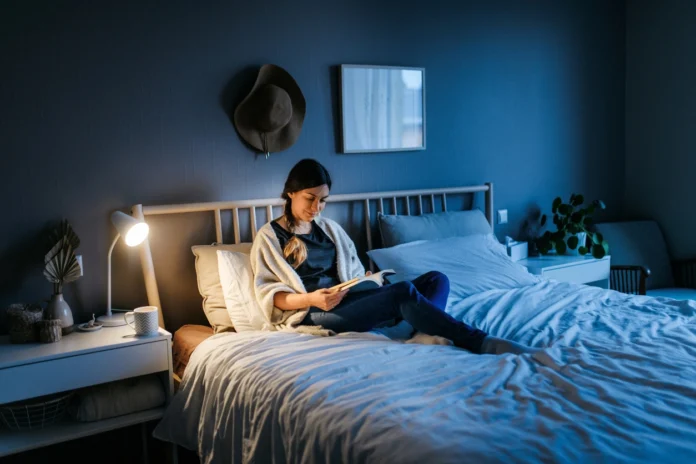
A good night’s sleep is highly significant for maintaining physical and mental health. Unfortunately, many people struggle with getting the recommended 7-9 hours of sleep each night due to various factors, including their bedtime habits.
Certain activities, such as using electronic devices, consuming caffeine, or exercising, can interfere with sleep and leave people feeling groggy and tired the next day. In this article, we’ll discuss in detail crucial reasons why you should avoid these activities before bedtime for a better night’s sleep.
1. Using Too Many Electronic Devices
The blue light that is emitted from electronic devices such as phones, tablets, laptops, and televisions can interfere with sleep quality. This type of light suppresses the production of the melatonin hormone, making it harder for people to fall asleep and stay asleep.
Furthermore, the stimulation provided by these devices can keep the brain active and make it difficult to wind down before bed. Research has shown that even a small amount of exposure to blue light before bedtime can have a negative impact on sleep quality, so it’s important to avoid using electronic devices for at least an hour before bedtime.
2. Consuming Caffeine

Many people know that caffeine represents a stimulant that impacts our central nervous system and can keep people awake and alert. When a person is consuming caffeine, especially in the late afternoon or even in the evening, that person will have difficulties falling asleep and staying asleep.
Caffeine can take several hours to wear off, and consuming it before bedtime can increase the frequency of bathroom trips during the night, leading to disrupted sleep. If you want to improve sleep quality, it’s best to get rid of the habit of consuming caffeine at least six hours before bedtime.
3. Exercising
Exercising before bedtime can interfere with sleep by revving up the body and making it harder to fall asleep. Physical activity releases adrenaline and other stress hormones that can leave people feeling alert and awake.
Additionally, exercising close to bedtime can raise the body’s core temperature, making it more difficult to fall asleep. If you want to avoid negative effects, it’s best to finish exercising at least three hours before bedtime.
4. Eating a Heavy Meal

Eating a heavy meal before bedtime can interfere with sleep by causing indigestion and discomfort. Large meals can also increase the frequency of bathroom trips during the night, leading to disrupted sleep.
Furthermore, eating high-fat and high-carbohydrate foods before bedtime can cause higher blood sugar levels, which will make it more difficult to fall asleep and stay asleep. Therefore, it would be the best decision to finish eating at least three hours before you decide to go to bed and, additionally, to opt for a light, healthy snack before bed.
5. Working
Engaging in intense or stressful activities, such as work-related tasks or arguments, before bedtime can have a negative impact on sleep quality and overall well-being. When we are under stress or tension, our bodies release the hormone cortisol, which triggers the fight or flight response and makes it difficult to relax and fall asleep.
Furthermore, stressful or intense activities can cause the mind to become overly active, leading to racing thoughts and difficulty falling asleep.
6. Drinking Alcohol

Drinking alcohol before bedtime can interfere with sleep by disrupting the normal sleep cycle. Alcohol is a sedative that can make people feel drowsy, but it can also cause disrupted sleep, including waking up during the night. As you can now conclude, it’s best to avoid drinking alcohol before bedtime and opt for a glass of water instead.
Avoiding these activities before bedtime can help improve sleep quality and leave people feeling refreshed the next day. By making small changes to their bedtime habits, people can experience the benefits of a good night’s sleep and improve their overall well-being. It is highly important to take care of your physical and mental health.
4 Ways to Replace the Activities that Interrupt the Sleep
Avoiding activities that interfere with sleep is only half the battle. It is also important to find alternative activities that can help prepare the mind and body for a good night’s sleep.
In this section, we’ll discuss several ways to replace the activities that interfere with sleep, including reading, practicing relaxation techniques, and creating a bedtime routine.
1. Reading
Reading before bedtime can be a great way to replace the use of electronic devices and wind down before sleep. Reading a physical book, rather than a tablet or phone, can also help reduce exposure to blue light and improve sleep quality.
Also, reading a calming and relaxing book can help prepare the mind for sleep and promote a sense of calm and relaxation.
According to recent research by Betway Casino which you can check here they found that when a person reads before bed, they get an average sleep score of 76% with the average time spent sleeping at 7 hours and 13 minutes.
2. Family and Friends

We also learnt that spending time with family and friends can help you have a better night’s sleep with an average sleep score of 68%. So in essence, playing mobile gaming to even the old fashion board games, it really doesn’t matter what you do, so long as you’re together with either family or friends.
3. Practicing Relaxation Techniques
Practicing relaxation techniques before bedtime, including deep breathing, meditation, and yoga, can help replace activities such as exercising and drinking alcohol. These techniques can help you calm the mind and reduce accumulated stress. As an outcome, you will be able to sleep peacefully.
4. Creating a Bedtime Routine
Creating a bedtime routine can help replace activities such as consuming caffeine and eating heavy meals before bedtime. A bedtime routine can include activities such as taking a warm bath, stretching, and practicing relaxation techniques. Having a consistent bedtime routine can help signal to the body that it’s time to prepare for sleep and make it easier to fall asleep and stay asleep.











